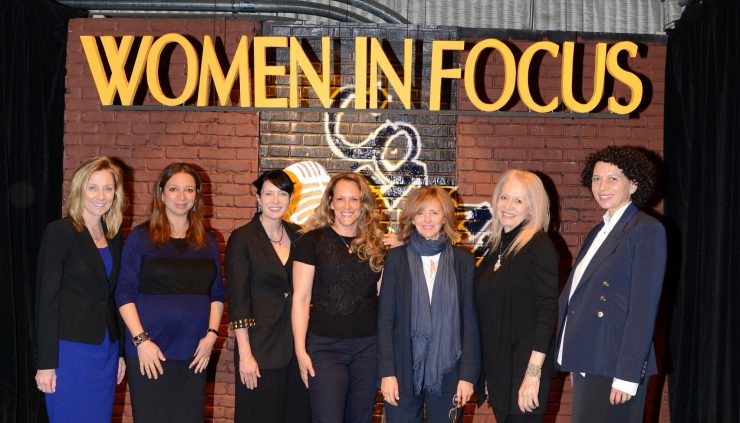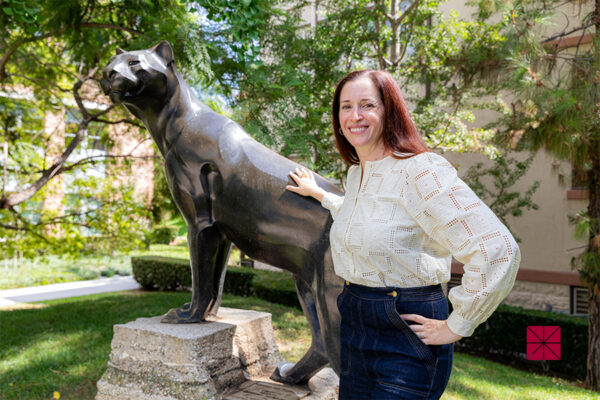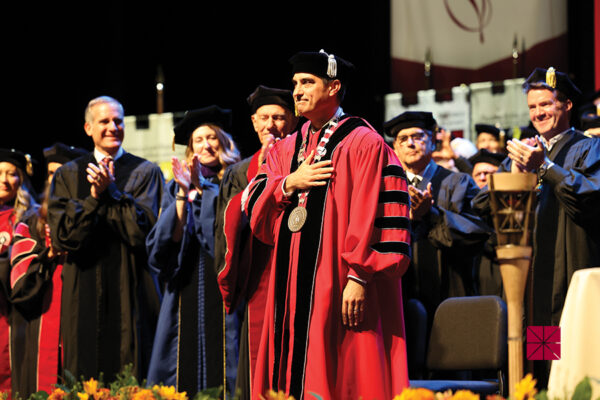Comedy should be a coed sport, say the women filmmakers whose success is leveling a laughter-packed playing field.
Across six decades of work and more than 80 mostly wonderful films, Jack Nicholson has done just about everything there is to do in Hollywood. But until 2003, when he signed on to play Harry Sanborn in the romantic comedy Something’s Gotta Give, he had never been directed by a woman.
“Tell me about it,” said Nancy Meyers, the film’s director, writer and producer, drawing great laughter from the predominantly female audience during the annual Women in Focus panel discussion at Chapman University.
“Here’s the truth: I love him, he’s a really good friend,” Meyers said of Nicholson. “But if anyone had told me that during our first week of shooting, I would have said you are out of your mind — he and I will never end up liking each other.
“The first week was tough; the second week was tough. The third got better. It just got better. It was a war — but not for long.”
War stories were what many in the crowd of film students came to hear as they filled Folino Theater at Dodge College of Film and Media Arts. This year’s Women in Focus panel featuring film industry titans was themed Women in Comedy, and attendees got front-line stories full of humor, to be sure. But they also got much more, including an optimistic vision of what lies ahead for women filmmakers.
“Across the board, the climate is changing drastically in favor of us, and you need to own that,” said producerdirector-choreographer Anne Fletcher, whose directing credits include The Guilt Trip (2012), starring Barbra Streisand and Seth Rogen, and The Proposal (2009), with Sandra Bullock and Ryan Reynolds. “The time of sexism and belittling women is going away.”
Of course, with her next breath Fletcher shared a story of how one day a male studio executive interrupted shooting on The Guilt Trip to offer what she thought were unnecessary notes. When she pushed back, he added barriers to their professional relationship — a tack she knows he wouldn’t have taken if she were a man.
His insecurity was showing, she said, and it’s important that women not respond in kind.
“Stay in your strength and your support and your talent and your creativity,” Fletcher said. “Don’t get sucked into craziness.”
Donna Langley, co-chair of Universal Pictures, noted that rejection comes with the territory for filmmakers, along with “stupid notes and people who do not understand your work,” she added. “It’s your passion for your project that should drive you forward regardless.”
Langley’s own passion drove her to champion the film version of Mamma Mia! even though she got laughed out of the project’s first greenlight meeting.
“It was a movie I wanted to see, and over time my enthusiasm got people on the bandwagon,” she said.
The 2008 film, for which the marketing team originally projected $15 million in box office, grossed $450 million worldwide.
“So believe in your passion, even if it involves ABBA,” Langley counseled with a smile.
Bridesmaids (2011) is another big winner during the Langley era at Universal — and the runaway hit has become a touchstone of sorts for makers of female-centric comedies. A “Bridesmaids effect” probably is driving a surge in such films, the panelists allowed. But as was noted by Maya Rudolph, who starred in Bridesmaids: Should it really be a surprise that women can be funny?
“It’s a coed sport,” Rudolph said of comedy. “Where were they when we did our sketches on Saturday Night Live? Did they go to the bathroom every time we came on?”
Though Bridesmaids may be helping to open doors in Hollywood for funny women, the panelists said that good work transcends trends.
“The truth is you have to fight to get the work as a human being, not just as a woman,” Rudolph said.
But that doesn’t mean women filmmakers shouldn’t maximize their advantages, said Diablo Cody, who won the Oscar for best original screenplay for her 2007 breakout film Juno.
“People are always saying that every story has been told, but I don’t think that every woman’s story has been told,” she said. “There’s still stuff we need to get off our chest, whereas the guys have been talking for a long time, so they may be out of stories.”
Penelope Spheeris certainly isn’t out of stories. Her tales of directing male-dominated comedies such as Wayne’s World and Black Sheep had the Folino Theater audience howling. For instance, one time she was
so frustrated by a male studio executive that she took a ballpoint pen and let the air out of the tires on his limo.
“I’m not saying that should be a first choice,” she said, “but sometimes you just have to get out there and let more air out of tires.”
And sometimes it makes more sense just to be steadfast and strategic, as well as collaborative and diplomatic, Fletcher said.
“Women make incredible leaders because we can operate in the gray areas,” she noted. “We have a chance to be the calming voice.”
Plus, as the six Women in Focus panelists prove, it never hurts to be supremely talented. An outstanding script and a wellspring of confidence can even win over actors who are new to taking direction from a woman.
“Jack is close with a lot of women, and now I’m one of them,” Meyers said of Nicholson. “He calls me Chief. In 10 years, he has never said my name. Once he looked at me and said, ‘I’m bringing you a headdress, Chief.’”
To Meyers it’s a sign that things are headed in the right direction.





Add comment